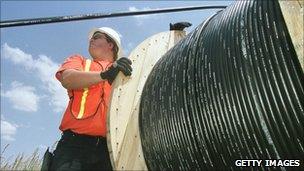UK government pushes ahead with rural broadband plans
- Published

Many rural areas lack access to fast broadband technology, such as fibre optics.
The government is pushing ahead with the second wave of funding for super-fast broadband across the UK.
It comes despite the fact that no firms or technologies have yet been chosen for original pilot areas earmarked to test how to roll out next-generation broadband to remote areas.
New bids are now being invited for a further £50m.
The government has pledged to make the UK the best place for super-fast broadband in Europe by 2015.
The £50m will be made available to local authorities around the UK.
"This is very much a locally-driven process and we encourage bids from all local people with plans for improving broadband in their local area," said Chancellor of the Exchequer George Osborne.
Local councils wanting to take advantage of the latest tranche of funding will need to apply via the Broadband Delivery UK.
The government estimated that the funding would help a further 800,000 homes to benefit from next-generation broadband.
Slow progress
Some have questioned the timing of the new scheme, given that pilots intended to be testbeds for best practice in connecting the so-called 'final third' have yet to begin.
This is the third of UK homes that are not economically attractive to firms such as BT and Virgin Media because offering next-generation services there would cost too much money.
At the time they were announced Secretary of State for Culture, Media and Sport Jeremy Hunt said: "Our aim is to use these rural market testing pilots to discover exactly what needs to be done to make super-fast broadband commercially viable in rural communities".
Despite announcing the four areas in October - North Yorkshire, Cumbria, Herefordshire and the Highlands and Islands - no firm or technologies have yet been chosen for the areas.
Each trial was allocated a fund of between £5m and £10m.
Lack of progress led Labour MP Ian Lucas to ask the government to "pull its finger out" last month.
A spokesman for the Department for Culture, Media and Sport conceded that it has been a long process.
"Councils are having to get everything ready. They have to know what work needs to be done."
He said that announcements would be made soon.
In total the government has earmarked £530m of public money to be spent on bringing super-fast broadband to rural areas.
This money is drawn from the BBC licence fee and was originally earmarked to help people with the switch over to digital TV.
Any funds to speed up broadband roll-out should be applauded said Sebastien Lahtinen of broadband news site ThinkBroadband.
"This crucial step will be welcomed by those living in the 'final third', the most remote areas of the UK which currently suffer from a lack of decent broadband services.
However, many in those areas will continue to be frustrated that it's going to take years to roll out across the entire country," he said.
- Published6 December 2010
- Published10 February 2011
- Published13 January 2011
- Published9 December 2010